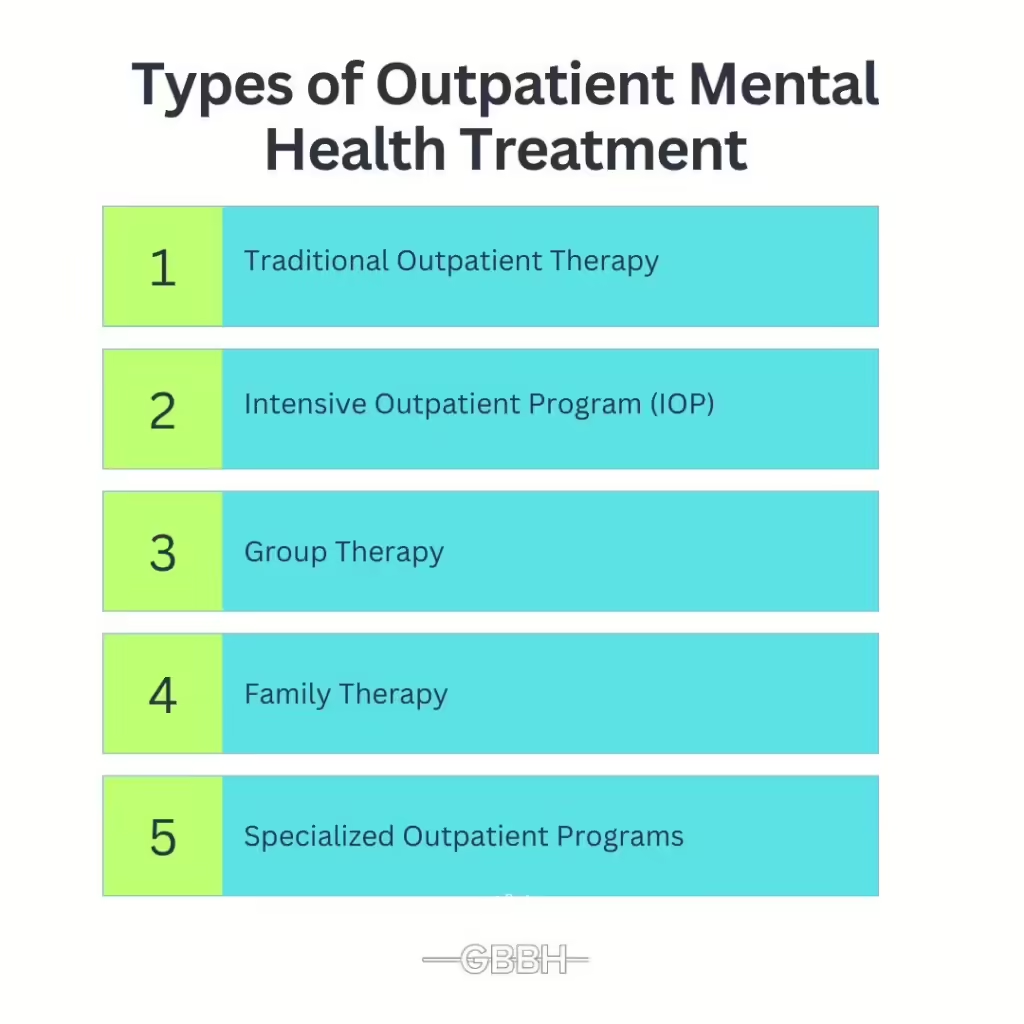Outpatient mental health treatment is a flexible and effective approach to addressing mental health issues while allowing individuals to maintain their daily routines. This form of treatment provides comprehensive care and support without requiring the individual to stay overnight at a facility. Whether through regular therapy sessions, group support, or specialized treatment programs, outpatient care helps individuals manage their mental health while continuing to live at home, work, or attend school.
At Greater Boston Behavioral Health, we offer a range of outpatient Mental Health Therapy Programs designed to support individuals in achieving emotional wellness and stability. Our programs include traditional therapy methods like Cognitive-Behavioral Therapy (CBT), Dialectical Behavior Therapy (DBT), and more intensive options such as the Intensive Outpatient Program (IOP).
How Does Outpatient Mental Health Treatment Work?
Outpatient mental health treatment allows individuals to receive therapy and other support services on a scheduled basis, typically a few times a week. This form of treatment is ideal for individuals who do not require 24-hour care but still need professional support for managing mental health challenges.
Our Mental Health Treatment Center in Massachusetts offers various outpatient programs, each designed to cater to different levels of need. These programs may include individual therapy, group therapy, family therapy, and specialized treatment plans for conditions such as anxiety, depression, trauma, and substance use disorders.
Outpatient programs vary in intensity and structure, making them adaptable for clients with different needs. For those requiring more frequent and structured care, an Intensive Outpatient Program (IOP) offers a higher level of support, with multiple therapy sessions per week, but still allows individuals to return home each day.
Who Can Benefit from Outpatient Mental Health Treatment?
Outpatient programs are ideal for individuals who:
- Have a stable home environment and support system
- Are experiencing mild to moderate symptoms of mental health conditions
- Have completed inpatient treatment and need continued care as they transition back to daily life
- Need structured support but can function in their daily responsibilities, such as work or school
This type of care is particularly effective for individuals who need to balance treatment with their daily lives, offering the flexibility to manage both their mental health and personal commitments.
At Greater Boston Behavioral Health, we work closely with clients to assess their specific needs and recommend the most appropriate outpatient program. Whether it’s regular therapy sessions or the more structured Intensive Outpatient Program (IOP), our team ensures that each client receives the care they need to manage their mental health effectively.
Types of Outpatient Mental Health Treatment
Traditional Outpatient Therapy
This involves regular sessions with a therapist to address issues such as anxiety & depression, trauma, or relationship problems. At Greater Boston Behavioral Health, we offer evidence-based therapies like Cognitive-Behavioral Therapy (CBT) and Dialectical Behavior Therapy (DBT) to help clients develop coping strategies and improve their emotional well-being.
Intensive Outpatient Program (IOP)
Our IOP is designed for individuals who need more structured support than traditional outpatient therapy but do not require inpatient care. The program typically includes multiple therapy sessions per week, combining individual and group therapy. This higher level of care is ideal for clients managing more severe symptoms or those transitioning from inpatient treatment.
Group Therapy
Group therapy is a valuable component of outpatient treatment that allows individuals to share their experiences, receive support from peers, and learn from others facing similar challenges. It’s an essential part of our Mental Health Programs at Greater Boston Behavioral Health.
Family Therapy
Mental health challenges often affect the entire family. Outpatient treatment can include family therapy sessions, helping families communicate better, resolve conflicts, and support each other throughout the treatment process.
Specialized Outpatient Programs
Some outpatient programs are tailored to specific needs, such as substance use disorders, trauma recovery, or grief counseling. These specialized programs focus on the unique challenges of each individual, ensuring that they receive targeted care.
Benefits of Outpatient Mental Health Treatment
- Flexibility: Outpatient treatment allows individuals to continue their daily activities, such as work, school, and family responsibilities, while receiving mental health care. This makes it easier to integrate treatment into their lives without major disruptions.
- Personalized Care: At Greater Boston Behavioral Health, our outpatient programs are tailored to each client’s unique needs, ensuring that they receive the right level of care and support. Whether it’s traditional therapy or the Intensive Outpatient Program (IOP), our team works to create a treatment plan that addresses specific goals and challenges.
- Cost-Effective: Outpatient programs tend to be more affordable than inpatient or residential treatment, making them a practical option for those seeking professional care without the high costs associated with full-time facilities.
- Continuity of Care: Outpatient treatment provides ongoing support, allowing individuals to continue their recovery journey even after completing more intensive treatment programs. It ensures that they maintain the progress made during inpatient care or while managing acute symptoms.
- Supportive Environment: Outpatient programs offer structured, professional care while enabling individuals to remain in their home environment. This can enhance the healing process, allowing clients to apply the skills they learn in therapy directly to their daily lives.
Why Choose Greater Boston Behavioral Health for Outpatient Mental Health Treatment?
At Greater Boston Behavioral Health, we offer a range of Mental Health Treatment Programs to meet the diverse needs of our clients. Our outpatient services provide flexible, personalized care for individuals seeking support with their mental health while maintaining their daily responsibilities. Our team of experienced therapists and mental health professionals works collaboratively with clients to develop treatment plans that promote long-term emotional and psychological well-being.
Whether you’re seeking individual therapy, group support, or the structure of an Intensive Outpatient Program (IOP), our Mental Health Treatment Center in Massachusetts is here to help you achieve your wellness goals. Call us at: (888)278-0716 today for more info.
Conclusion
Outpatient mental health treatment is an excellent option for individuals who need professional care without the need for residential treatment. With flexible options like traditional therapy, group therapy, and Intensive Outpatient Programs (IOP), outpatient care can be a crucial part of managing mental health while maintaining daily life responsibilities. At GBBH, we are committed to providing compassionate, effective care through our wide range of Mental Health Therapy Programs, ensuring that each client receives the support they need for their mental health journey.
Frequently Asked Questions About Outpatient Mental Health Treatment
What is the difference between outpatient and inpatient treatment?
Inpatient treatment involves staying at a facility full-time for a period of intensive care, while outpatient treatment allows individuals to live at home and attend therapy sessions on a scheduled basis. Outpatient programs are generally less intensive and provide more flexibility.
What is an Intensive Outpatient Program (IOP)?
An Intensive Outpatient Program (IOP) offers a higher level of care than traditional outpatient therapy. It typically includes multiple therapy sessions per week, combining individual and group therapy, and is designed for individuals who need more support but do not require inpatient treatment.
Who is a good candidate for outpatient mental health treatment?
Outpatient treatment is ideal for individuals with mild to moderate mental health symptoms, those who have a stable home environment, and those who need ongoing support after completing an inpatient or residential program. It is also suitable for people balancing treatment with daily responsibilities, such as work or school.
What types of therapy are included in outpatient mental health treatment?
At Greater Boston Behavioral Health, our outpatient programs may include Cognitive-Behavioral Therapy (CBT), Dialectical Behavior Therapy (DBT), group therapy, family therapy, and specialized treatments for conditions such as anxiety, depression, and trauma.
Can I work or attend school while receiving outpatient treatment?
Yes, outpatient treatment is designed to provide flexibility. Clients can continue working, attending school, or managing family responsibilities while receiving therapy on a scheduled basis.
How often do I attend therapy sessions in outpatient treatment?
The frequency of sessions depends on the level of care required. Traditional outpatient therapy may involve weekly or bi-weekly sessions, while an Intensive Outpatient Program (IOP) typically requires multiple sessions per week.


